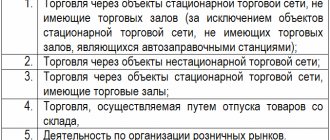The concept of tax obligation and its execution
See also Information from the Federal Tax Service of Russia “On the procedure for paying taxes by other persons.”
Tax liability represents one of the most important categories of tax law, in relation to which the majority of tax legal relations are formed.
Tax liability:
- in a broad aspect, includes a set of measures of proper behavior of the taxpayer, defined by Art. 23 Tax Code of the Russian Federation;
- in a narrow aspect, this is part of the taxpayer’s tax obligations, which represents the implementation of a constitutionally established measure of proper behavior in the payment of legally established taxes and fees.
The Tax Code of the Russian Federation allocates the fulfillment of the obligation to pay taxes and fees in a separate chapter from the total set of obligations of taxpayers (payers of fees).
Fulfilling the obligation to pay taxes and fees is a complex legal fact, since it involves a whole system of taxpayer responsibilities:
- register with the tax authority;
- keep tax records;
- independently calculate the tax base and determine the tax amount based on it;
- transfer the tax to the appropriate budget, etc.
The essence of fulfilling tax obligations:
- payment of a tax or fee.
The content of the tax obligation consists of imperative norms - requirements of the state for the payment of relevant taxes or fees.
However, the mechanism for implementing the fulfillment of tax obligations also allows for optional elements, allowing, in particular, contractual procedures between the taxpayer and the authorized state body.
Grounds for the emergence, change and termination of the obligation to pay taxes and fees
The obligation to pay a tax or fee arises, changes and terminates if there are grounds established by the Tax Code of the Russian Federation or another regulatory legal act on taxes and fees (Article 44 of the Tax Code of the Russian Federation).
General grounds for the emergence of tax liability:
- whether the taxpayer has an object of taxation;
- the expiration of the tax period, at the end of which the tax must be calculated and paid.
Special grounds for the emergence of tax liability:
- independent legal facts that form a complex factual composition (for example, mandatory notification of the taxpayer about the payment of tax - in relation to taxes, the calculation of which is carried out by tax authorities (transport and land tax, property tax for individuals).
More details
The primary element of a tax obligation is the moment from which this obligation begins to exist. Tax legislation connects the obligation to pay tax with the moment of occurrence of circumstances requiring the payment of a specific tax or fee. In fact, the tax obligation is established for each type of tax, since for each tax or fee the moment the obligation to pay the tax arises and the timing of its implementation are determined differently.
The amount of tax payable for the tax period is calculated by the taxpayer independently on the basis of the tax base, tax rate and tax benefits. Consequently, the basis for the emergence of a tax liability is the tax base. The amount remaining from the taxable item after applying the necessary deductions and tax benefits will be subject to payment.
Regarding some taxes, the legal fact underlying the obligation to pay these taxes consists not only of material, but also of procedural circumstances. Thus, in cases provided for by the tax legislation of the Russian Federation, the responsibility for calculating the amount of tax may be assigned to the tax authority or tax agent. Legal relations for the payment of such taxes arise on the basis of the actual composition (complex legal fact), the components of which are the tax base and the regulatory act of the tax authority. The need for a complex legal fact is always indicated in the tax law hypothesis.
The fulfillment of tax obligations is clearly defined by a time frame. Deadlines for payment of taxes and fees are established for each tax and fee. Changing the tax payment deadline is allowed only according to the rules established by the Tax Code of the Russian Federation. Thus, Federal Law No. 320-FZ dated November 23, 2015 sets the deadline for payment of property taxes (land, transport and personal property taxes) no later than December 1 of the year following the expired tax period.
When paying taxes with a complex legal composition (i.e. when the tax base is calculated by the tax authority), the tax obligation arises no earlier than the date of receipt of the tax notice. Violation of the tax payment deadline will result in the accrual of penalties.
The tax payment deadline is one of the mandatory elements of the tax law and must be determined for each tax or fee. At the same time, in certain cases, tax authorities have the right to change the deadlines for paying taxes, but only in the manner prescribed by the Tax Code of the Russian Federation. For example, when creating, liquidating or reorganizing an organization in relation to those taxes for which the tax period is a calendar month or quarter, it is possible to change the deadlines for paying taxes by agreement with the tax authority.
Grounds for termination of tax liability (clause 3 of article 44 of the Tax Code of the Russian Federation)
- payment of tax and (or) fee;
- death of an individual taxpayer or declaring him dead in the manner established by the civil procedural legislation of the Russian Federation (tax debts specified in paragraph 3 of Article 14 and Article 15 of the Tax Code of the Russian Federation of a deceased person or a person declared dead are paid off by the heirs);
- liquidation of the taxpayer organization after all settlements with the budgetary system of the Russian Federation;
- the occurrence of other circumstances with which the legislation on taxes and fees relates to the termination of the obligation to pay the relevant tax or fee, which may include:
- forced collection of tax at the expense of non-cash funds or other property of the taxpayer (Article 46-48 of the Tax Code);
- payment of tax to a reorganized organization by its legal successor (Article 50 of the Tax Code);
- payment of tax by a person authorized by the guardianship and trusteeship body for a missing taxpayer (clause 1 of Article 51 of the Tax Code);
- payment of tax by a guardian for an incapacitated taxpayer (clause 2 of article 51 of the Tax Code);
- write-off of bad tax debts (Article 59 of the Tax Code);
- payment of tax by a guarantor for the taxpayer (Article 74 of the Tax Code), etc.
Tax liability, like any other duty, is terminated by proper execution. Fulfillment of tax obligation is considered to be payment of tax in full and on time.
In general, in accordance with Art. 45 of the Tax Code of the Russian Federation, the taxpayer is obliged to independently fulfill the obligation to pay tax. However, Federal Law No. 401-FZ of November 30, 2016 allowed payment of tax for a taxpayer by another person (see also Information from the Federal Tax Service of Russia “On tax payments transferred by another person”).
In exceptional cases established only by tax legislation, the fulfillment of tax obligations may be entrusted to other persons:
- tax agents (Article 24 of the Tax Code of the Russian Federation);
- legal successor of the reorganized enterprise (Article 50 of the Tax Code of the Russian Federation);
- legal or authorized representative (Article 26 of the Tax Code of the Russian Federation);
- guarantor (Article 74 of the Tax Code of the Russian Federation).
More information about the performance of duties during the reorganization of a legal entity
According to Art. 50 of the Tax Code of the Russian Federation, the fulfillment of obligations to pay taxes of a reorganized legal entity is assigned to its legal successor (successors), regardless of whether the facts and (or) circumstances of non-fulfillment or improper fulfillment of these obligations by the reorganized legal entity were known to the legal successor (successors) before the completion of the reorganization. In this case, the legal successor(s) must pay all penalties due for the obligations transferred to him.
See also Information from the Federal Tax Service of Russia “From October 1, the procedure for calculating penalties for legal entities is changing” (2017)
At the same time, the Tax Code of the Russian Federation establishes various methods for transferring tax debt, depending on the content of the tax obligation of the reorganized organization. Thus, in contrast to the amounts of unpaid taxes and penalties, the successor is obliged to pay tax sanctions only on the condition that these fines were imposed on the reorganized entity before the completion of its reorganization.
Deadline for fulfilling tax obligations
The deadline for fulfilling tax obligations is established by tax legislation in relation to each specific tax.
The taxpayer is not prohibited from paying the relevant tax early, i.e. after the tax liability arises, but before the deadline for payment established by law.
The moment the taxpayer (payer of the fee, tax agent) fulfills his obligation to pay tax (Clause 3 of Article 45 of the Tax Code of the Russian Federation):
- as a general rule:
- the moment of presentation to the bank of an order to pay tax;
- the day an individual deposits cash into a bank, local administration cash office or federal postal service organization to pay tax;
- when collecting tax at the source of payment - from the moment the mandatory payment is withheld by the tax agent;
- in order to offset the previously overpaid amount of tax in accordance with Art. 78 of the Tax Code of the Russian Federation - from the date the tax authority makes a decision to offset the amounts of overpaid or overcharged taxes, penalties, fines towards the fulfillment of the obligation to pay the corresponding tax.
Consequently, the Tax Code of the Russian Federation distinguishes between the payment of tax as an action of the taxpayer himself and the actual transfer of tax to the budget as the action of a bank (other authorized organization) serving the taxpayer (fee). Fulfillment by the taxpayer of the obligation to pay tax by presenting to the bank a properly executed and secured payment order entails the termination of the tax legal relationship between the taxpayer and the state (municipal entity) and the emergence of budgetary relations.
Tax Code of the Russian Federation Article 45. Fulfillment of the obligation to pay taxes, fees, insurance contributions
If a taxpayer (another person who has submitted to the bank an order to transfer funds to the budget system of the Russian Federation to pay a tax for a taxpayer) discovers an error in the execution of an order to transfer a tax, which does not result in the non-transfer of this tax to the budget system of the Russian Federation to the appropriate account of the Federal Treasury , the taxpayer has the right to submit to the tax authority at the place of his registration a statement of an error, attaching documents confirming the payment of the specified tax and its transfer to the budget system of the Russian Federation to the appropriate account of the Federal Treasury, with a request to clarify the basis, type and nature of the payment, tax period or payer status (as amended by Federal Law No. 401-FZ of November 30, 2016)
At the proposal of the tax authority or taxpayer, a joint reconciliation of taxes paid by the taxpayer (for the taxpayer) may be carried out. The results of the reconciliation are documented in an act signed by the taxpayer and an authorized official of the tax authority (as amended by Federal Law No. 401-FZ of November 30, 2016)
The tax authority has the right to demand from the bank a copy of the taxpayer’s order to transfer tax to the budget system of the Russian Federation to the appropriate account of the Federal Treasury, issued by the taxpayer or another person who presented to the bank an order to transfer funds to the budget system of the Russian Federation to pay the tax for the taxpayer, on on paper. The bank is obliged to submit to the tax authority a copy of the specified order within five days from the date of receipt of the tax authority’s request (as amended by Federal Law No. 401-FZ of November 30, 2016)
In the case provided for by this paragraph, on the basis of an application from the taxpayer and an act of joint reconciliation of calculations for taxes, fees, penalties and fines, if such a joint reconciliation was carried out, the tax authority makes a decision to clarify the payment on the day of actual payment of the tax to the budget system of the Russian Federation for the corresponding Federal Treasury account. In this case, the tax authority recalculates the penalties accrued on the amount of tax for the period from the date of its actual payment to the budget system of the Russian Federation to the appropriate account of the Federal Treasury until the day the tax authority makes a decision to clarify the payment (as amended by Federal Laws dated July 27, 2010 N 229-FZ, dated November 30, 2016 N 401-FZ)
The tax authority notifies the taxpayer of the decision to clarify the payment within five days after the decision is made (paragraph introduced by Federal Law No. 229-FZ of July 27, 2010)



